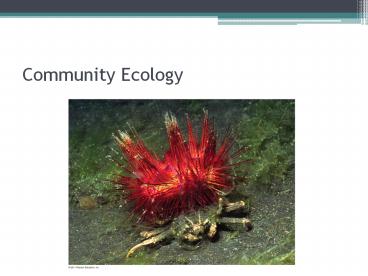Community%20Ecology
Title: Community%20Ecology
1
Community Ecology
2
- Community group of populations of different
species living close enough to interact
3
Ecological niche the sum total of an organisms
use of abiotic/biotic resources in the environment
4
- Interspecific competition resources are in short
supply - Competitive exclusion principle Two species
cannot coexist in a community if their niches are
identical. - Resource partitioning differences in niches that
enable similar species to coexist
5
- Dominant species has the highest biomass or is
the most abundant in the community - Keystone species exert control on community
structure by their important ecological niches - Loss of sea otter ? increase sea urchins,
destruction of kelp forests - Grizzly bear (transfer nutrients from sea ? land
by salmon diet) - Prairie dogs (burrows, soil aeration, trim
vegetation)
6
Keystone species a species that plays a unique
and crucial role in the way an ecosystem functions
7
Indicator Species any biological species that
defines a trait or characteristic of the
environment
8
Invasive Species a plant or animal that is not
native to a specific location (an Introduced
species) and has a tendency to spread, which is
believed to cause damage to the environment,
human economy and/or human health.
9
(No Transcript)
10
Invasive Species
- Organisms that become established outside native
range - Kudzu vine plant from Japan, noxious weed that
kills trees shrubs
11
Invasive Species
- Dutch elm disease fungus carried by beetles
- Arrived in U.S. on logs imported from Netherlands
- Death of many elm trees across U.S., Europe,
Canada - Try to cultivate resistant strains of elm trees
12
Invasive Species
- Potato Blight fungus-like disease caused Irish
Potato Famine in 1840s - Arrived in Ireland from ships coming from U.S.
- Only 1 species of potato planted in Ireland ? all
susceptible to disease - 1 million people died
- Problem with monoculture lack of genetic
diversity of crops
13
Interspecific interactions
- Can be positive (), negative (-) or neutral (0)
- Includes
- Competition (-/-)
- Predation (/-)
- Symbiosis
- parasitism, mutualism, commensalism
14
Predation (/-)
- Defensive adaptations include
- Cryptic coloration camouflaged by coloring
- Aposematic or warning coloration bright color
of poisonous animals - Batesian mimicry harmless species mimic color
of harmful species - Mullerian mimicry 2 bad-tasting species
resemble each other both to be avoided - Herbivory plants avoid this by chemical toxins,
spines, thorns
15
(No Transcript)
16
Symbiotic Relationships
- Symbiosis- two species living together
3 Types of symbiosis 1. Commensalism (/0) 2.
Parasitism (/-) 3. Mutualism (/)
17
Symbiotic Relationships
- Commensalism-
- one species benefits and the other is neither
harmed nor helped - Ex. orchids on a tree
Epiphytes A plant, such as a tropical orchid or
a bromeliad, that grows on another plant upon
which it depends for mechanical support but not
for nutrients. Also called xerophyte, air plant.
18
Symbiotic Relationships
- Commensalism-
- one species benefits and the other is neither
harmed nor helped - Ex. polar bears and cyanobacteria
19
Symbiotic Relationships
- Parasitism- one species benefits (parasite) and
the other is harmed (host)
20
Symbiotic Relationships
- Mutualism- beneficial to both species
- Ex. cleaning birds and cleaner shrimp
- Ex. Lichen
21
LICHEN This fungus and algae are likin one
another Algae gets ride with the fungus and can
expand into different environments Fungus gets
food the algae (autotroph) makes
22
Type of relationship Species harmed Species benefits Species neutral
Commensalism
Parasitism
Mutualism
1 species
23
Disturbances influences species diversity and
composition of ecosystems
- A disturbance changes a community by removing
organisms or changing resource availability
(fire, drought, flood, storm, human activity) - Ecological succession transitions in species
composition in a certain area over ecological
time
24
Primary Succession
- Plants animals invade where soil has not yet
formed - Ex. colonization of volcanic island or glacier
25
Secondary Succession
- Occurs when existing community is cleared by a
disturbance that leaves soil intact - Ex. abandoned farm, forest fire































